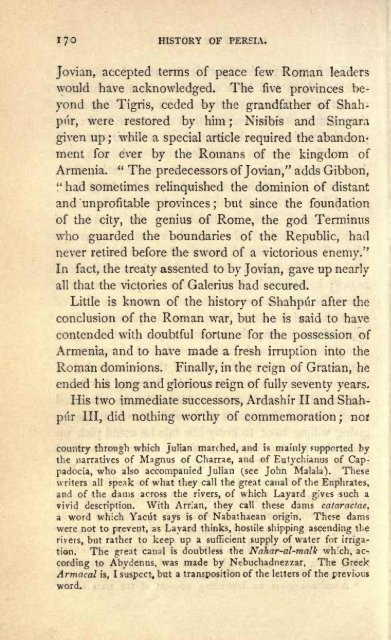Persia from the Earliest Period to the Arab
Persia from the Earliest Period to the Arab
Persia from the Earliest Period to the Arab
Create successful ePaper yourself
Turn your PDF publications into a flip-book with our unique Google optimized e-Paper software.
IJO HISTORY OF PERSIA.<br />
Jovian, accepted terms of peace few Roman leaders<br />
would have acknowledged. The five provinces be-<br />
yond <strong>the</strong> Tigris, ceded by <strong>the</strong> grandfa<strong>the</strong>r<br />
of Shah-<br />
pnr, were res<strong>to</strong>red by him ; Nisibis and Singara<br />
given up ; while a special article required <strong>the</strong> abandonment<br />
for ever by <strong>the</strong> Romans of <strong>the</strong> kingdom of<br />
Armenia. " The predecessors of Jovian," adds Gibbon,<br />
" had sometimes relinquished <strong>the</strong> dominion of distant<br />
and unprofitable provinces ; but since <strong>the</strong> foundation<br />
of <strong>the</strong> city, <strong>the</strong> genius of Rome, <strong>the</strong> god Terminus<br />
who guarded <strong>the</strong> boundaries of <strong>the</strong> Republic, had<br />
never retired before <strong>the</strong> sword of a vic<strong>to</strong>rious enemy."<br />
In fact, <strong>the</strong> treaty assented <strong>to</strong> by Jovian, gave up nearly<br />
all that <strong>the</strong> vic<strong>to</strong>ries of Galerius had secured.<br />
Little is known of <strong>the</strong> his<strong>to</strong>ry of Shahpiir after <strong>the</strong><br />
conclusion of <strong>the</strong> Roman war, but he is said <strong>to</strong> have<br />
contended with doubtful fortune for <strong>the</strong> possession of<br />
Armenia, and <strong>to</strong> have made a fresh irruption in<strong>to</strong> <strong>the</strong><br />
Roman dominions. Finally, in <strong>the</strong> reign of Gratian, he<br />
ended his long and glorious reign of fully seventy years.<br />
His two immediate successors, Ardashir II and Shah-<br />
pur III, did nothing worthy of commemoration; nor<br />
country through which Julian marched, and is mainly supported by<br />
<strong>the</strong> narratives of Magnus of Charrae, and of Eutychianus of Cappadocia,<br />
who also accompanied Julian (see John Malala). These<br />
writers all speak of what <strong>the</strong>y call <strong>the</strong> great canal of <strong>the</strong> Euphrates,<br />
and of <strong>the</strong> dams across <strong>the</strong> rivers, of which Layard gives such a<br />
vivid description. With Arrian, <strong>the</strong>y call <strong>the</strong>se dams calarac/ae,<br />
a word which Yaciit is says of Nabathaean origin. These dams<br />
were not <strong>to</strong> prevent, as Layard thinks, hostile shipping ascending <strong>the</strong><br />
rivers, but ra<strong>the</strong>r <strong>to</strong> keep up a sufficient supply of water for irrigation.<br />
The great canal is doubtless <strong>the</strong> Nahar-al-malk which, according<br />
<strong>to</strong> Abyder.us, was made by Nebuchadnezzar, The Greek<br />
Armacal is, I suspect, but a transposition of <strong>the</strong> letters of <strong>the</strong> previous<br />
word.

















